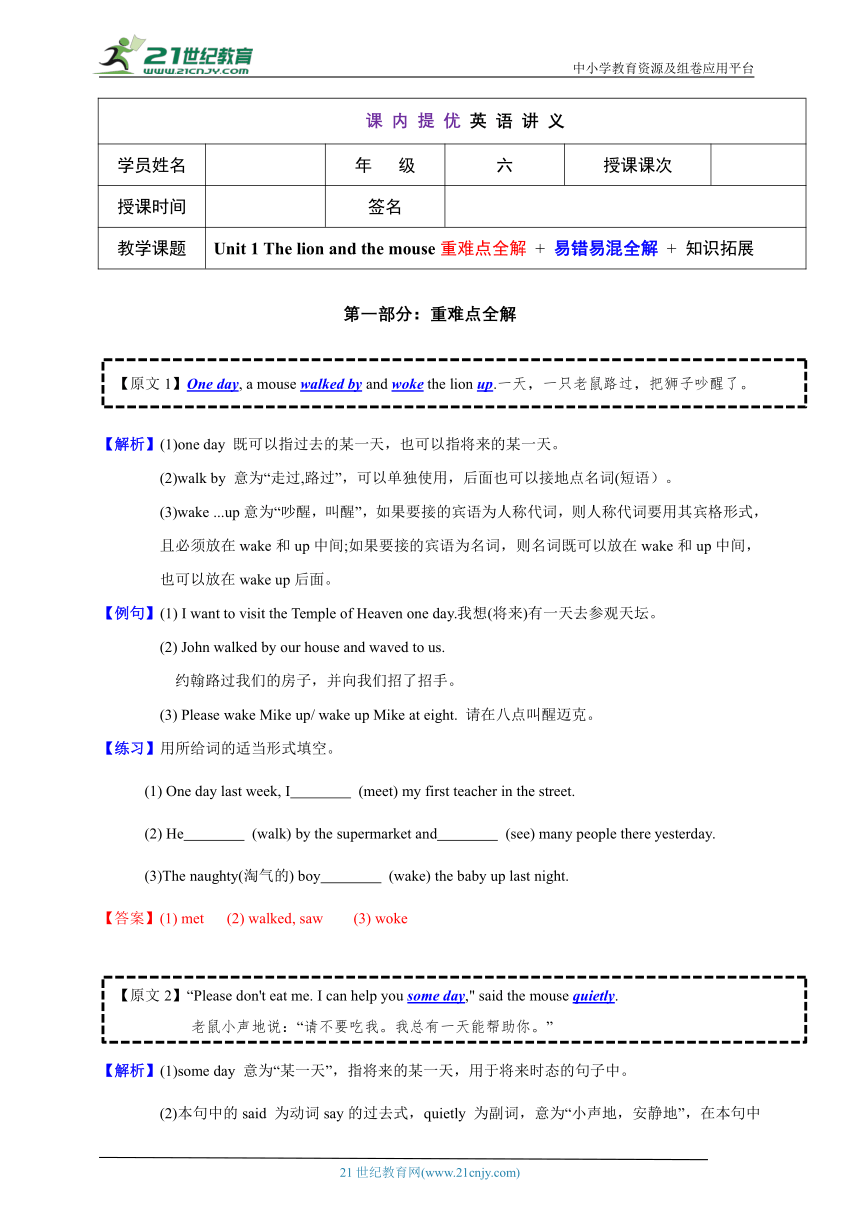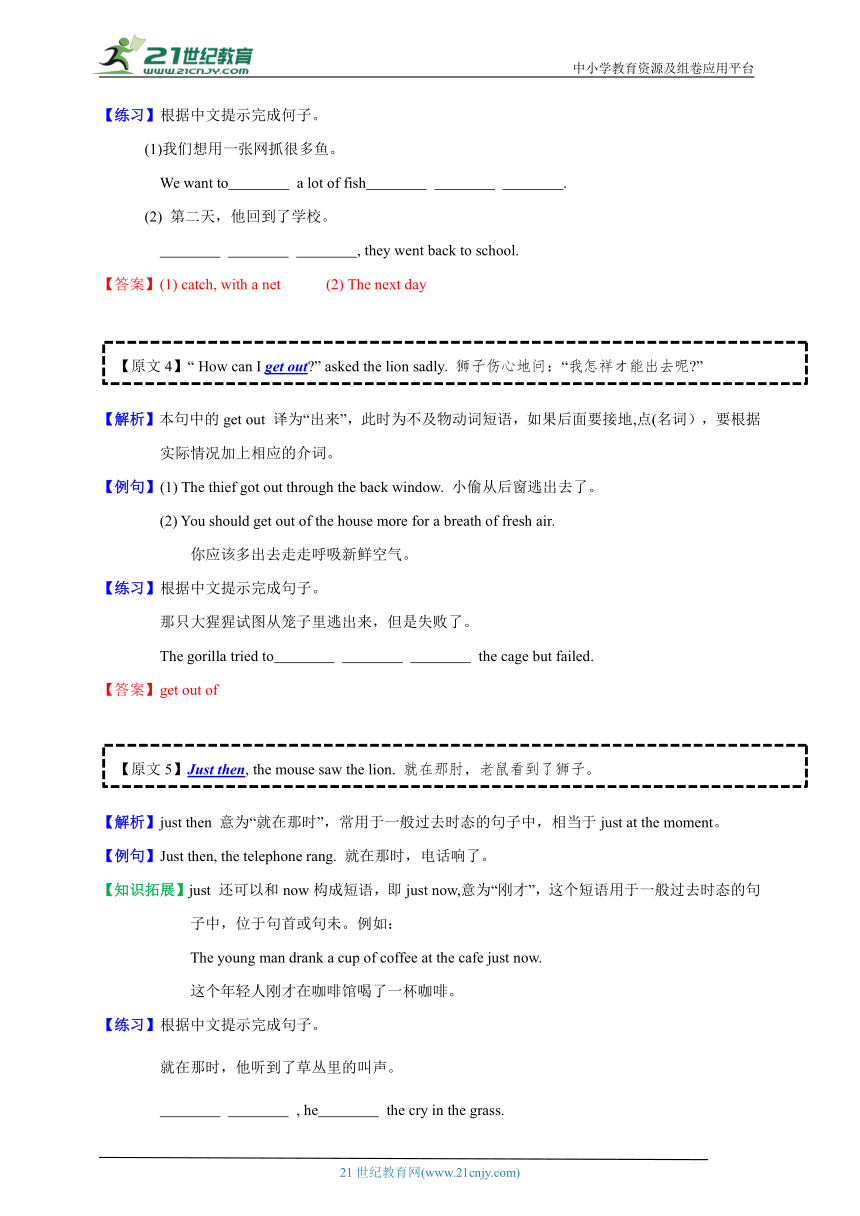Unit 1 The lion and the mouse课内提优讲义
文档属性
| 名称 | Unit 1 The lion and the mouse课内提优讲义 |  | |
| 格式 | doc | ||
| 文件大小 | 1.2MB | ||
| 资源类型 | 试卷 | ||
| 版本资源 | 牛津译林版 | ||
| 科目 | 英语 | ||
| 更新时间 | 2023-02-16 17:01:27 | ||
图片预览



文档简介
中小学教育资源及组卷应用平台
课 内 提 优 英 语 讲 义
学员姓名 年 级 六 授课课次
授课时间 签名
教学课题 Unit 1 The lion and the mouse重难点全解 + 易错易混全解 + 知识拓展
第一部分:重难点全解
【解析】(1)one day 既可以指过去的某一天,也可以指将来的某一天。
(2)walk by 意为“走过,路过”,可以单独使用,后面也可以接地点名词(短语)。
(3)wake ...up意为“吵醒,叫醒”,如果要接的宾语为人称代词,则人称代词要用其宾格形式,且必须放在wake和up中间;如果要接的宾语为名词,则名词既可以放在wake和up中间,也可以放在wake up后面。
【例句】(1) I want to visit the Temple of Heaven one day.我想(将来)有一天去参观天坛。
(2) John walked by our house and waved to us.
约翰路过我们的房子,并向我们招了招手。
(3) Please wake Mike up/ wake up Mike at eight. 请在八点叫醒迈克。
【练习】用所给词的适当形式填空。
(1) One day last week, I (meet) my first teacher in the street.
(2) He (walk) by the supermarket and (see) many people there yesterday.
(3)The naughty(淘气的) boy (wake) the baby up last night.
【答案】(1) met (2) walked, saw (3) woke
【解析】(1)some day 意为“某一天”,指将来的某一天,用于将来时态的句子中。
(2)本句中的said 为动词say的过去式,quietly 为副词,意为“小声地,安静地”,在本句中用来修饰前面的动词过去式said。副词一般用来修饰动词或形容词,在句子中作状语。
【知识拓展】副词的种类很多,大多数是由形容词变化而成,常见的变化规则如下:
一般在形容词词尾直接加-ly,例如:excited-excitedly, loud-loudly, sad-sadly。
以“辅音宇母十y”结尾的形容词,先将词尾的y变为i,再加-ly,例如:happy-happily,angry-angrily.
以-le 或以“元音字母十不发音的字母e”结尾的形容词,需先去掉词尾的e,再加-ly,例如:
terrible-terribly, true-truly。
形副同形,例如:hard-hard, early-early, late-late, fast-fast.
不规则变化,例如:good-well。
注意:friendly(友好的)和lovely(可爱的)是形容词,不是副词。
【例句】(1) I’ll be a pilot some day. 有朝一日,我将会成为一名飞行员。
(2) He's reading quietly by the window. 他正在窗边安静地阅读。
【练习】用所给词的适当形式填空。
(1) May (go) to Shanghai some day.
(2) The boy walked (quick) away.
(3) The old man looked at him and (say) nothing.
【答案】(1) is going/ will go (2) quickly (3) said
【解析】(1)the next day 意为“第二天”,是指某个特定时间的后一天,既可指过去,也可指将来,但它在本单元课文中表示过去。
(2)caught 为动词catch的过去式,属于动词过去式的不規则变化。本句中的介词 with 译为
“用;使用”,指使用某种工具或手段。catch ....with….意为“用……抓住。
【例句】(1) The next day, we visited our grandparents. 第二天,我们拜访了我们的祖父母。
(2) Little Tim can draw pictures with crayons. 小蒂姆会用蜡笔画画。
【练习】根据中文提示完成何子。
(1)我们想用一张网抓很多鱼。
We want to a lot of fish .
(2) 第二天,他回到了学校。
, they went back to school.
【答案】(1) catch, with a net (2) The next day
【解析】本句中的get out 译为“出来”,此时为不及物动词短语,如果后面要接地,点(名词),要根据实际情况加上相应的介词。
【例句】(1) The thief got out through the back window. 小偷从后窗逃出去了。
(2) You should get out of the house more for a breath of fresh air.
你应该多出去走走呼吸新鲜空气。
【练习】根据中文提示完成句子。
那只大猩猩试图从笼子里逃出来,但是失败了。
The gorilla tried to the cage but failed.
【答案】get out of
【解析】just then 意为“就在那时”,常用于一般过去时态的句子中,相当于just at the moment。
【例句】Just then, the telephone rang. 就在那时,电话响了。
【知识拓展】just 还可以和now构成短语,即just now,意为“刚才”,这个短语用于一般过去时态的句子中,位于句首或句未。例如:
The young man drank a cup of coffee at the cafe just now.
这个年轻人刚才在咖啡馆喝了一杯咖啡。
【练习】根据中文提示完成句子。
就在那时,他听到了草丛里的叫声。
, he the cry in the grass.
【答案】Just then, heard
【解析】from then on 意为“从那时起”,在句子中作时间状语,常置于句首,多用于一般过去时
态的句子中。
【例句】From then on, he never talked to me. 从那时起,他就不和我说话了。
【知识拓展】from now on 意为“从现在开始;从此;从今以后”,通常用于一般将来时态的句子中。例如:
We're going to have to save money from now on. 从现在开始,我们不得不省钱。
【练习】根据中文提示完成句子。
从那时起,这个可怜的小女孩不得不靠卖火柴谋生。
, the poor girl to sell matches to make a living.
【答案】From then on, had
【解析】cheer for ……意为“为 …欢呼”,如果后面所接的宾语为人称代词,则人称代词要用其宾格形式。
【例句】 Everyone cheers for Charlotte happily. 每个人都高兴地为夏洛特欢呼。
【练习】单项选择。
( )I'm cheering my favourite football team excitedly.
A. for B. to C. of
【答案】A
第二部分:易错易混全解
易混淆形容词和副词的用法
【例题】单项选择。
( ) Su Hai is a girl. She can dance .
A. beautiful; beautifully B. beautiful; beautiful
C. beautifully; beautiful
【答案】A
点拨:
beautiful 为形容词,意为“美丽的;美好的”,用来修饰名词,置于它所修饰的名词之前;beautifully 为副词,意为“美好地;美妙地;漂亮地”,一般用来修饰动词。第一个设空处后为名词girl,所以第一个设空处用形容词;第二个设空处前为动词 dance,所以第二个设空处要用副词,故选 A。
wake up 的用法
【例题】单项选择。
( )Yang Ling's mother at six every morning.
A. wakes up her B. wakes her up C. wakes she up
【答案】B
点拨:
wake...up意为“吵醒,叫醒”,当所接的宾语为人称代词时,人称代词要用其宾格形式,且必须放在wake和up中间,故选B。
【原文1】One day, a mouse walked by and woke the lion up.一天,一只老鼠路过,把狮子吵醒了。
【原文2】“Please don't eat me. I can help you some day," said the mouse quietly.
老鼠小声地说:“请不要吃我。我总有一天能帮助你。”
【原文3】The next day, two men caught the lion with a large net.第二天,有两个人用一张大网抓住了狮子。
【原文4】“ How can I get out ” asked the lion sadly. 狮子伤心地问:“我怎祥オ能出去呢 ”
【原文5】Just then, the mouse saw the lion. 就在那肘,老鼠看到了狮子。
【原文6】From then on, the lion and the mouse became friends. 从那时起,狮子和老鼠成了朋友。
【原文7】Billy and Willy cheer for them loudly. 比利和威利为他们大声地欢呼。
HYPERLINK "http://21世纪教育网(www.21cnjy.com)
" 21世纪教育网(www.21cnjy.com)
课 内 提 优 英 语 讲 义
学员姓名 年 级 六 授课课次
授课时间 签名
教学课题 Unit 1 The lion and the mouse重难点全解 + 易错易混全解 + 知识拓展
第一部分:重难点全解
【解析】(1)one day 既可以指过去的某一天,也可以指将来的某一天。
(2)walk by 意为“走过,路过”,可以单独使用,后面也可以接地点名词(短语)。
(3)wake ...up意为“吵醒,叫醒”,如果要接的宾语为人称代词,则人称代词要用其宾格形式,且必须放在wake和up中间;如果要接的宾语为名词,则名词既可以放在wake和up中间,也可以放在wake up后面。
【例句】(1) I want to visit the Temple of Heaven one day.我想(将来)有一天去参观天坛。
(2) John walked by our house and waved to us.
约翰路过我们的房子,并向我们招了招手。
(3) Please wake Mike up/ wake up Mike at eight. 请在八点叫醒迈克。
【练习】用所给词的适当形式填空。
(1) One day last week, I (meet) my first teacher in the street.
(2) He (walk) by the supermarket and (see) many people there yesterday.
(3)The naughty(淘气的) boy (wake) the baby up last night.
【答案】(1) met (2) walked, saw (3) woke
【解析】(1)some day 意为“某一天”,指将来的某一天,用于将来时态的句子中。
(2)本句中的said 为动词say的过去式,quietly 为副词,意为“小声地,安静地”,在本句中用来修饰前面的动词过去式said。副词一般用来修饰动词或形容词,在句子中作状语。
【知识拓展】副词的种类很多,大多数是由形容词变化而成,常见的变化规则如下:
一般在形容词词尾直接加-ly,例如:excited-excitedly, loud-loudly, sad-sadly。
以“辅音宇母十y”结尾的形容词,先将词尾的y变为i,再加-ly,例如:happy-happily,angry-angrily.
以-le 或以“元音字母十不发音的字母e”结尾的形容词,需先去掉词尾的e,再加-ly,例如:
terrible-terribly, true-truly。
形副同形,例如:hard-hard, early-early, late-late, fast-fast.
不规则变化,例如:good-well。
注意:friendly(友好的)和lovely(可爱的)是形容词,不是副词。
【例句】(1) I’ll be a pilot some day. 有朝一日,我将会成为一名飞行员。
(2) He's reading quietly by the window. 他正在窗边安静地阅读。
【练习】用所给词的适当形式填空。
(1) May (go) to Shanghai some day.
(2) The boy walked (quick) away.
(3) The old man looked at him and (say) nothing.
【答案】(1) is going/ will go (2) quickly (3) said
【解析】(1)the next day 意为“第二天”,是指某个特定时间的后一天,既可指过去,也可指将来,但它在本单元课文中表示过去。
(2)caught 为动词catch的过去式,属于动词过去式的不規则变化。本句中的介词 with 译为
“用;使用”,指使用某种工具或手段。catch ....with….意为“用……抓住。
【例句】(1) The next day, we visited our grandparents. 第二天,我们拜访了我们的祖父母。
(2) Little Tim can draw pictures with crayons. 小蒂姆会用蜡笔画画。
【练习】根据中文提示完成何子。
(1)我们想用一张网抓很多鱼。
We want to a lot of fish .
(2) 第二天,他回到了学校。
, they went back to school.
【答案】(1) catch, with a net (2) The next day
【解析】本句中的get out 译为“出来”,此时为不及物动词短语,如果后面要接地,点(名词),要根据实际情况加上相应的介词。
【例句】(1) The thief got out through the back window. 小偷从后窗逃出去了。
(2) You should get out of the house more for a breath of fresh air.
你应该多出去走走呼吸新鲜空气。
【练习】根据中文提示完成句子。
那只大猩猩试图从笼子里逃出来,但是失败了。
The gorilla tried to the cage but failed.
【答案】get out of
【解析】just then 意为“就在那时”,常用于一般过去时态的句子中,相当于just at the moment。
【例句】Just then, the telephone rang. 就在那时,电话响了。
【知识拓展】just 还可以和now构成短语,即just now,意为“刚才”,这个短语用于一般过去时态的句子中,位于句首或句未。例如:
The young man drank a cup of coffee at the cafe just now.
这个年轻人刚才在咖啡馆喝了一杯咖啡。
【练习】根据中文提示完成句子。
就在那时,他听到了草丛里的叫声。
, he the cry in the grass.
【答案】Just then, heard
【解析】from then on 意为“从那时起”,在句子中作时间状语,常置于句首,多用于一般过去时
态的句子中。
【例句】From then on, he never talked to me. 从那时起,他就不和我说话了。
【知识拓展】from now on 意为“从现在开始;从此;从今以后”,通常用于一般将来时态的句子中。例如:
We're going to have to save money from now on. 从现在开始,我们不得不省钱。
【练习】根据中文提示完成句子。
从那时起,这个可怜的小女孩不得不靠卖火柴谋生。
, the poor girl to sell matches to make a living.
【答案】From then on, had
【解析】cheer for ……意为“为 …欢呼”,如果后面所接的宾语为人称代词,则人称代词要用其宾格形式。
【例句】 Everyone cheers for Charlotte happily. 每个人都高兴地为夏洛特欢呼。
【练习】单项选择。
( )I'm cheering my favourite football team excitedly.
A. for B. to C. of
【答案】A
第二部分:易错易混全解
易混淆形容词和副词的用法
【例题】单项选择。
( ) Su Hai is a girl. She can dance .
A. beautiful; beautifully B. beautiful; beautiful
C. beautifully; beautiful
【答案】A
点拨:
beautiful 为形容词,意为“美丽的;美好的”,用来修饰名词,置于它所修饰的名词之前;beautifully 为副词,意为“美好地;美妙地;漂亮地”,一般用来修饰动词。第一个设空处后为名词girl,所以第一个设空处用形容词;第二个设空处前为动词 dance,所以第二个设空处要用副词,故选 A。
wake up 的用法
【例题】单项选择。
( )Yang Ling's mother at six every morning.
A. wakes up her B. wakes her up C. wakes she up
【答案】B
点拨:
wake...up意为“吵醒,叫醒”,当所接的宾语为人称代词时,人称代词要用其宾格形式,且必须放在wake和up中间,故选B。
【原文1】One day, a mouse walked by and woke the lion up.一天,一只老鼠路过,把狮子吵醒了。
【原文2】“Please don't eat me. I can help you some day," said the mouse quietly.
老鼠小声地说:“请不要吃我。我总有一天能帮助你。”
【原文3】The next day, two men caught the lion with a large net.第二天,有两个人用一张大网抓住了狮子。
【原文4】“ How can I get out ” asked the lion sadly. 狮子伤心地问:“我怎祥オ能出去呢 ”
【原文5】Just then, the mouse saw the lion. 就在那肘,老鼠看到了狮子。
【原文6】From then on, the lion and the mouse became friends. 从那时起,狮子和老鼠成了朋友。
【原文7】Billy and Willy cheer for them loudly. 比利和威利为他们大声地欢呼。
HYPERLINK "http://21世纪教育网(www.21cnjy.com)
" 21世纪教育网(www.21cnjy.com)
